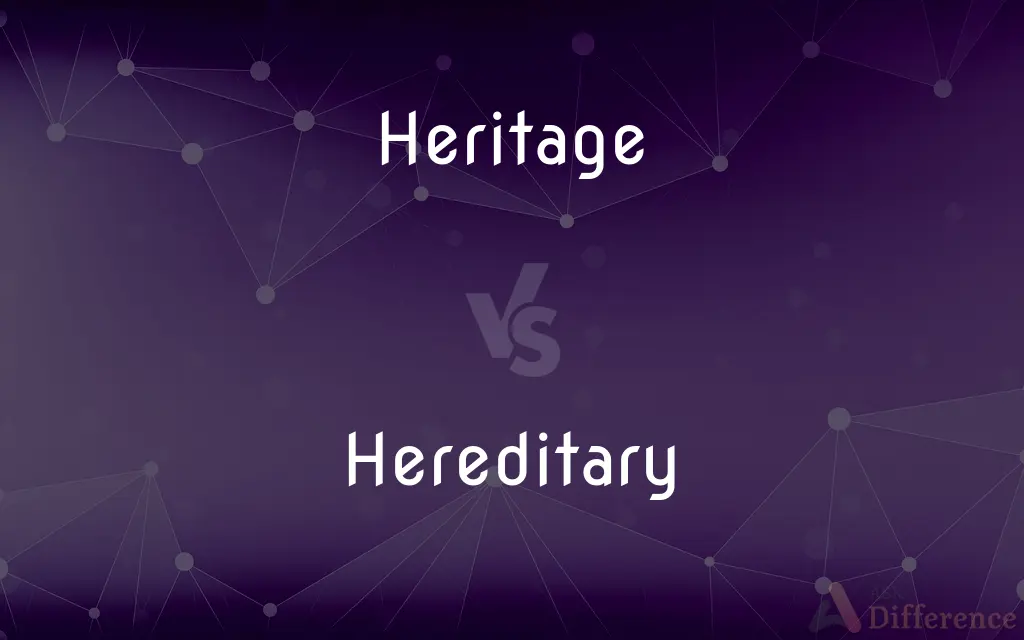Heritage vs. Hereditary — What's the Difference?
By Fiza Rafique & Urooj Arif — Updated on April 29, 2024
Heritage refers to the cultural traditions and assets inherited from previous generations, while hereditary involves genetic traits passed from parents to offspring.

Difference Between Heritage and Hereditary
Table of Contents
ADVERTISEMENT
Key Differences
Heritage encompasses cultural, historical, or natural assets that are passed down through generations, often shaping community identity and values. On the other hand, hereditary pertains to biological and genetic characteristics that are transmitted from parents to children, influencing physical traits and health.
Heritage is often associated with shared practices, knowledge, and symbols that hold significance for a group or society. In contrast, hereditary aspects are closely linked to the biological inheritance that affects an individual's development and can predispose them to certain medical conditions.
While heritage can be observed in languages, customs, buildings, and artworks, hereditary traits are visible in features like eye color, hair texture, and susceptibility to genetic disorders. These heritage elements can be preserved and celebrated, whereas hereditary traits are studied for understanding genealogical connections and health implications.
Heritage is usually preserved through education, preservation acts, and cultural celebrations, aiming to keep the legacy alive for future generations. Meanwhile, understanding hereditary traits involves scientific research and medical studies to manage or mitigate inherited health risks.
Cultural heritage sites and artifacts require legal protection and conservation efforts to ensure their survival and integrity. Conversely, hereditary information is safeguarded through privacy laws and ethical guidelines, particularly concerning genetic data and its implications.
ADVERTISEMENT
Comparison Chart
Definition
Traditions and assets passed through generations.
Genetic traits passed from parents to offspring.
Examples
Art forms, landmarks, languages.
Eye color, blood type, genetic disorders.
Preservation
Through museums, cultural practices.
Through genetic counseling, medical interventions.
Impact
Influences cultural identity and community practices.
Influences physical characteristics and health.
Legal and Ethical Care
Protected by cultural preservation laws.
Protected by privacy laws and ethical considerations.
Compare with Definitions
Heritage
Historical assets maintained over time.
These ancient manuscripts are a cherished part of our national heritage.
Hereditary
Family lineage determining genetic aspects.
The hereditary patterns in their family are well-documented.
Heritage
The practices passed down from ancestors.
The folk dances are a vibrant part of our heritage.
Hereditary
Inheritance of physical characteristics.
His tall stature is a hereditary trait in his family.
Heritage
Cultural symbols inherited over generations.
The castle is a significant heritage site for the city.
Hereditary
Traits genetically passed from parents to children.
Her blue eyes are hereditary, coming from her mother's side.
Heritage
Legacies preserved in community customs.
Storytelling is an important heritage that binds our community.
Hereditary
Biological inheritance impacting health.
Hereditary factors can influence one's susceptibility to allergies.
Heritage
Natural landscapes protected as part of heritage.
The national parks are preserved due to their heritage value.
Hereditary
Genetic predisposition to diseases.
Unfortunately, the risk of this illness is hereditary.
Heritage
Property that is or may be inherited; an inheritance
They had stolen his grandfather's heritage
Hereditary
(of a title, office, or right) conferred by or based on inheritance
The Queen's hereditary right to the throne
Heritage
A special or individual possession; an allotted portion
God's love remains your heritage
Hereditary
(of a set) defined such that every element which has a given relation to a member of the set is also a member of the set.
Heritage
Christians, or the ancient Israelites, seen as God's chosen people.
Hereditary
Of or relating to heredity or inheritance.
Heritage
Property that is or can be inherited; an inheritance.
Hereditary
Transmitted or capable of being transmitted genetically from parent to offspring
A hereditary disease.
Heritage
Something that is passed down from preceding generations; a tradition.
Hereditary
Passed down from one generation to the next
A hereditary prejudice.
Heritage
The status acquired by a person through birth; a birthright
A heritage of affluence and social position.
Hereditary
Being such or possessed by reason of birth
A hereditary aristocracy.
Heritage
A domesticated animal or a crop of a traditional breed, usually not widely produced for commercial purposes.
Hereditary
Capable of being inherited.
Heritage
An inheritance; property that may be inherited.
Hereditary
Descending from an ancestor to a legal heir; passing down by inheritance.
Heritage
A tradition; a practice or set of values that is passed down from preceding generations through families or through institutional memory.
Hereditary
Having title or possession through inheritance.
Heritage
A birthright; the status acquired by birth, especially of but not exclusive to the firstborn.
Hereditary
Passed on as an inheritance, by last will or intestate.
Heritage
(attributive) Having a certain background, such as growing up with a second language.
A heritage speaker; a heritage language
The university requires heritage Spanish students to enroll in a specially designed Spanish program not available to non-heritage students.
Hereditary
Of a title, honor or right: legally granted to somebody's descendant after that person's death.
Duke is a hereditary title which was created in Norman times.
Heritage
That which is inherited, or passes from heir to heir; inheritance.
Part of my heritage,Which my dead father did bequeath to me.
Hereditary
Of a person: holding a legally hereditary title or rank.
Hereditary rulers
Heritage
A possession; the Israelites, as God's chosen people; also, a flock under pastoral charge.
Hereditary
Of a disease or trait: passed from a parent to offspring in the genes.
Haemophilia is hereditary in his family.
Heritage
Practices that are handed down from the past by tradition;
A heritage of freedom
Hereditary
(math) Of a ring: such that all submodules of projective modules over the ring are also projective.
Heritage
Any attribute or immaterial possession that is inherited from ancestors;
My only inheritance was my mother's blessing
The world's heritage of knowledge
Hereditary
A hereditary ruler; a hereditary peer in the House of Lords.
Heritage
That which is inherited; a title or property or estate that passes by law to the heir on the death of the owner
Hereditary
Descended, or capable of descending, from an ancestor to an heir at law; received or passing by inheritance, or that must pass by inheritance; as, an hereditary estate or crown.
Heritage
Hereditary succession to a title or an office or property
Hereditary
Transmitted, or capable of being transmitted, as a constitutional quality or condition from a parent to a child; as, hereditary pride, bravery, disease.
Hereditary
Tending to occur among members of a family usually by heredity;
An inherited disease
Familial traits
Genetically transmitted features
Hereditary
Inherited or inheritable by established rules (usually legal rules) of descent;
Ancestral home
Ancestral lore
Hereditary monarchy
Patrimonial estate
Transmissible tradition
Common Curiosities
Can heritage include physical items?
Yes, heritage can include physical items like artworks and buildings.
Is hereditary always related to health?
Mostly, hereditary relates to both physical traits and health, including genetic disorders.
How is heritage preserved?
Through conservation efforts, education, and legal protections.
Can anyone have a heritage?
Yes, everyone has a heritage, which includes cultural, historical, or natural legacies.
How is cultural heritage different from natural heritage?
Cultural heritage involves human creations, while natural heritage includes natural landscapes and biodiversity.
Are all hereditary traits visible?
Not all; some, like susceptibility to diseases, are not immediately visible.
What is the difference between heritage and hereditary?
Heritage refers to cultural and historical legacies, whereas hereditary concerns genetic traits.
What role does hereditary play in medicine?
It is crucial for understanding genetic diseases and family health histories.
Is genetic testing important for hereditary traits?
Yes, it helps in predicting and managing inherited conditions.
How are hereditary traits passed to offspring?
Through genes inherited from both parents.
Can heritage influence one's identity?
Absolutely, heritage significantly shapes community and personal identity.
Can heritage change over time?
Yes, it can evolve as societies adopt new values or technologies.
Share Your Discovery

Previous Comparison
Maturity vs. Mature
Next Comparison
Plum vs. PlumbAuthor Spotlight
Written by
Fiza RafiqueFiza Rafique is a skilled content writer at AskDifference.com, where she meticulously refines and enhances written pieces. Drawing from her vast editorial expertise, Fiza ensures clarity, accuracy, and precision in every article. Passionate about language, she continually seeks to elevate the quality of content for readers worldwide.
Co-written by
Urooj ArifUrooj is a skilled content writer at Ask Difference, known for her exceptional ability to simplify complex topics into engaging and informative content. With a passion for research and a flair for clear, concise writing, she consistently delivers articles that resonate with our diverse audience.
















































